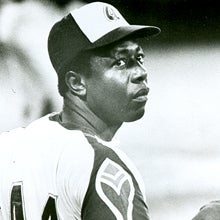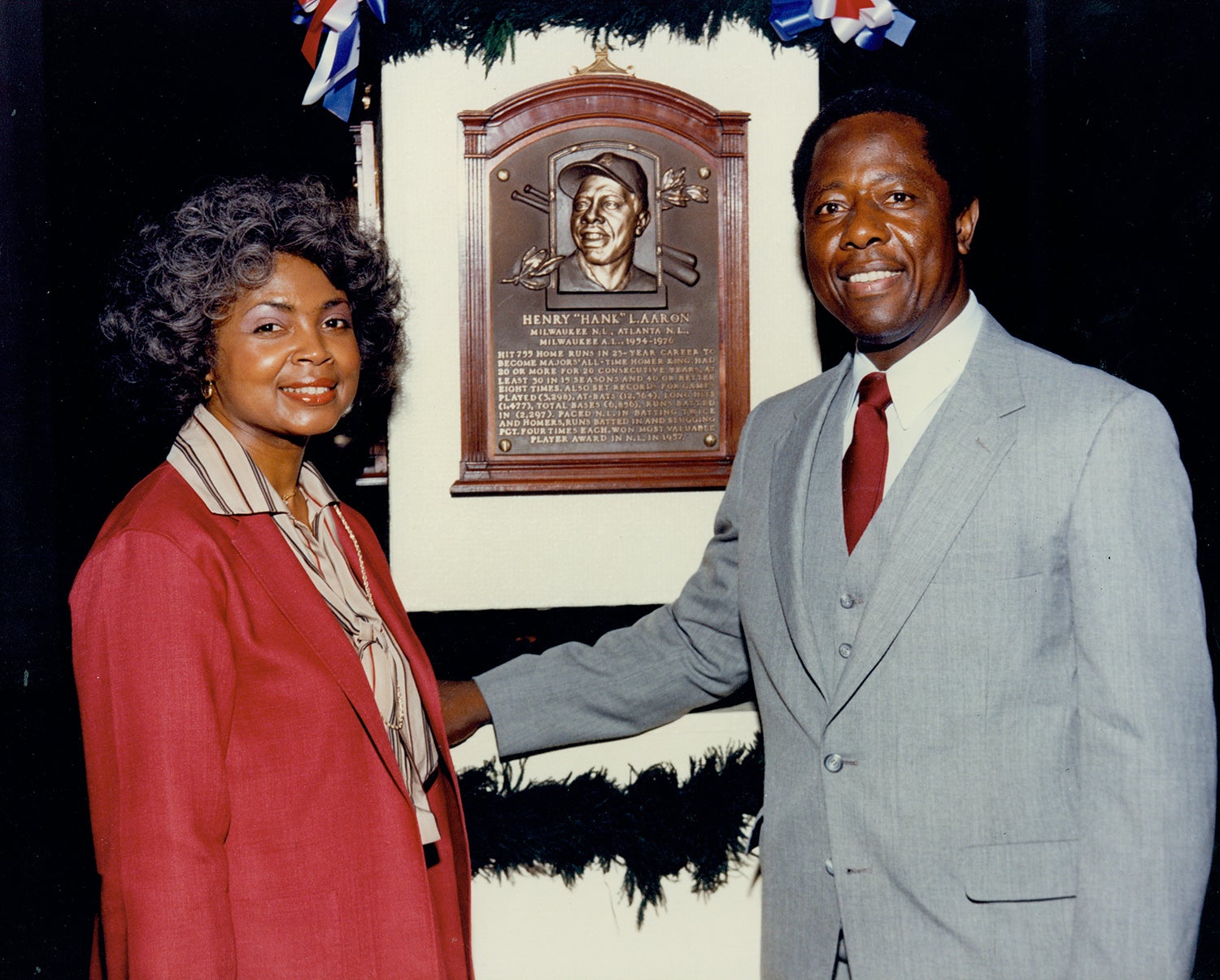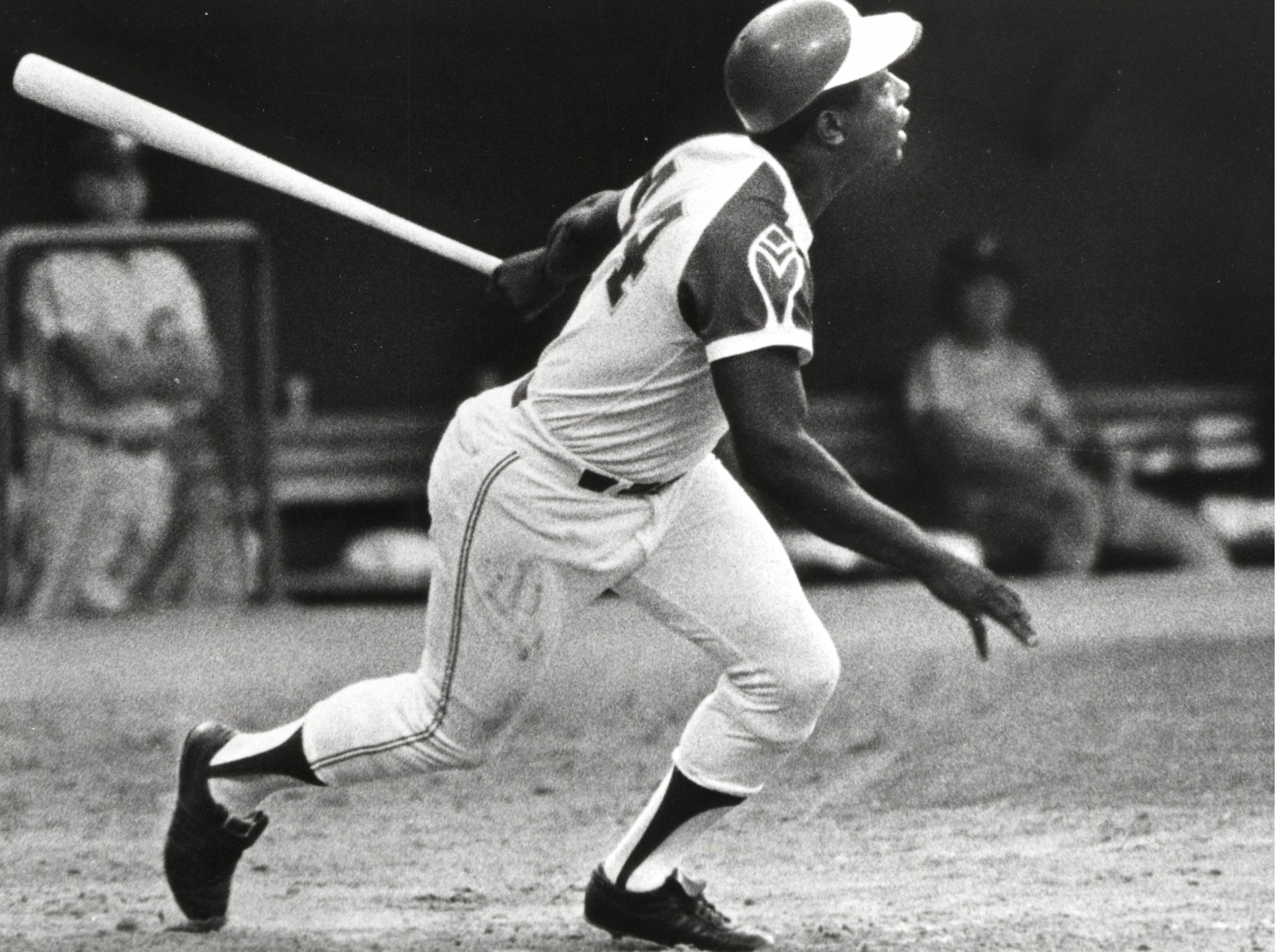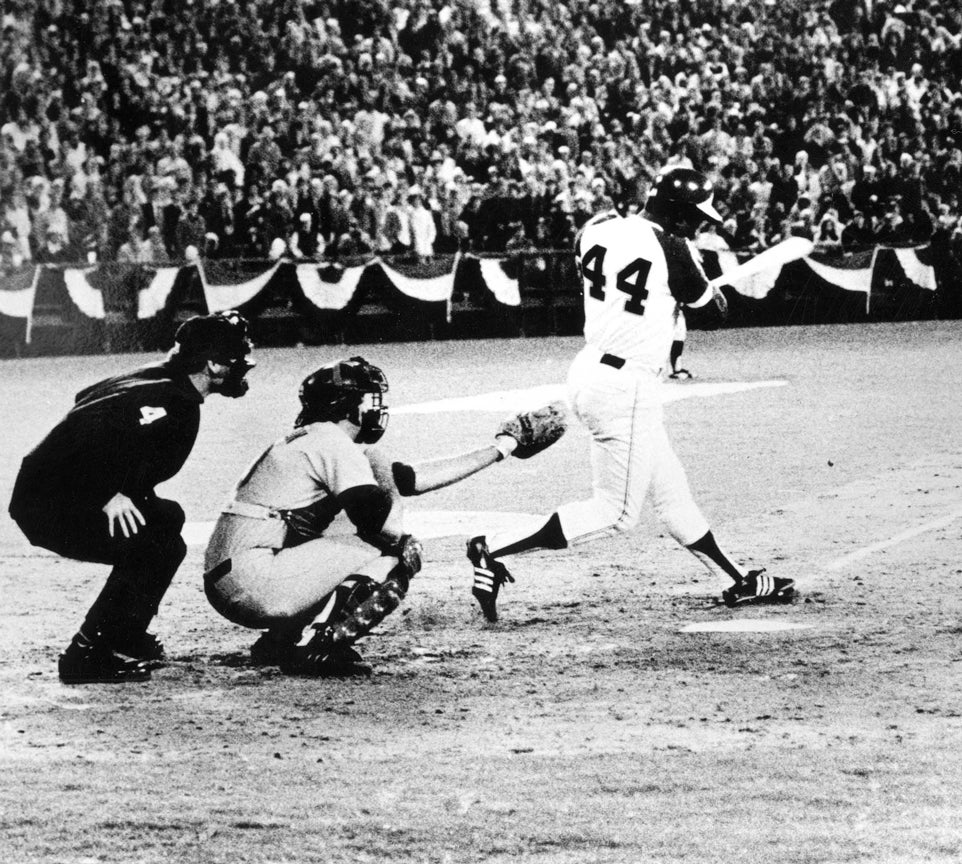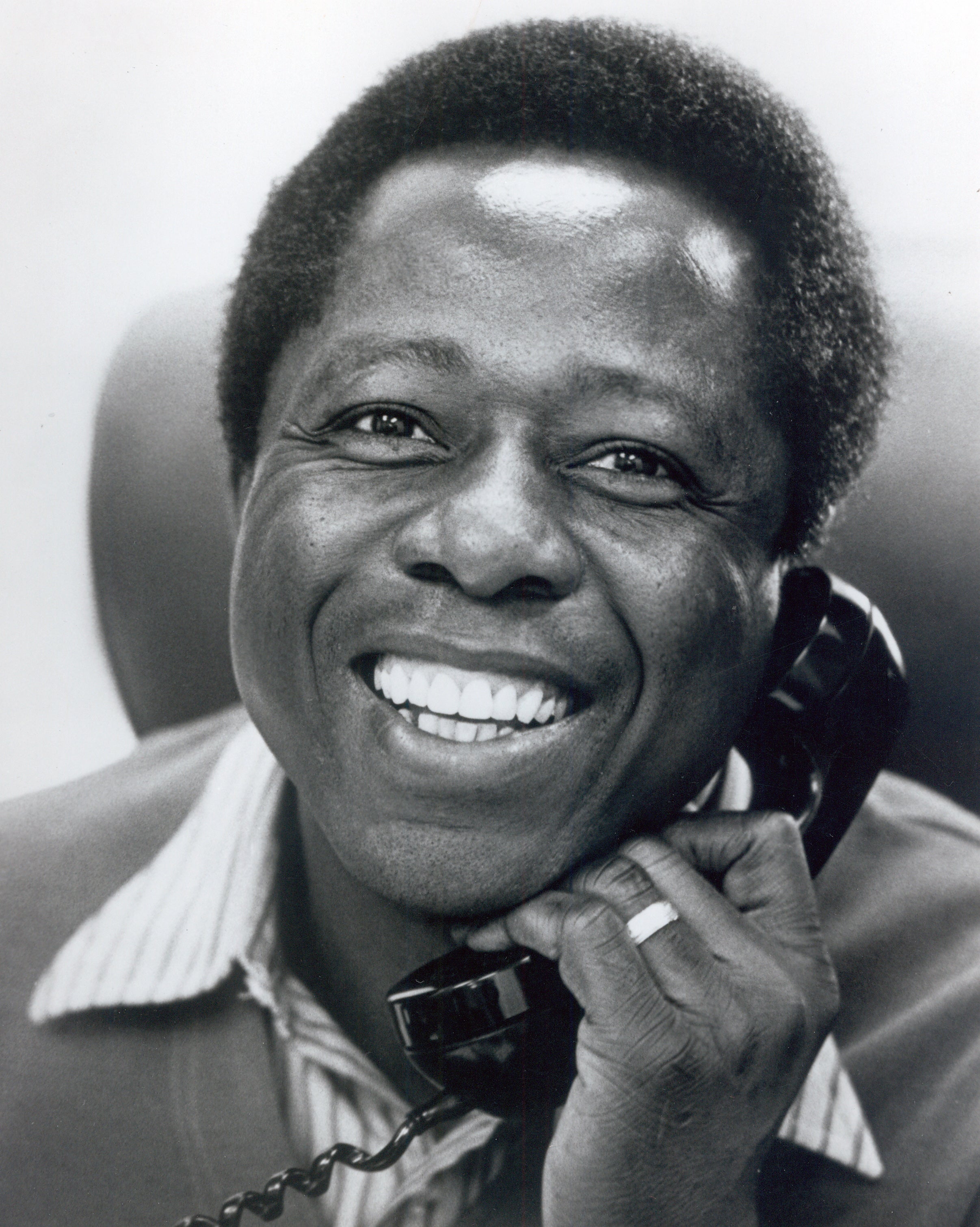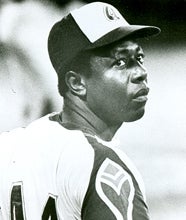- Home
- Our Stories
- Fifty years ago, Hank Aaron became king
Fifty years ago, Hank Aaron became king
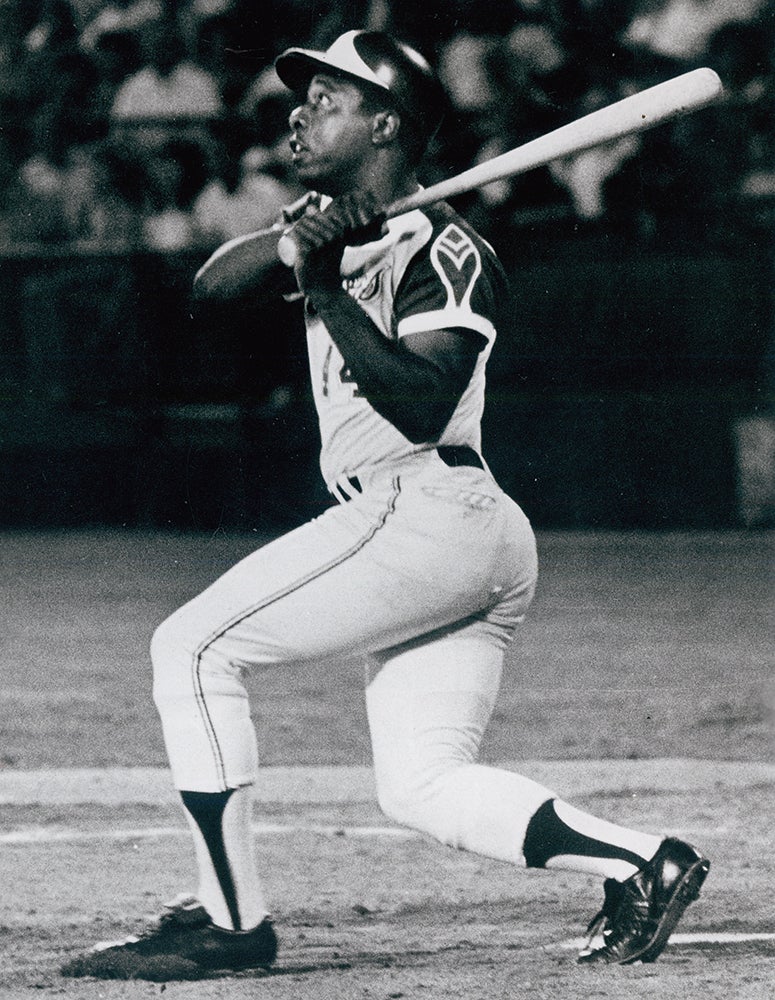
On April 8, 1974, Atlanta Stadium played host to one of the most iconic moments in baseball history. Four days after tying Babe Ruth’s record of 714 home runs, Hank Aaron went deep again to stand alone on the all-time leaderboard.
Years of anticipation and pressure culminated in Aaron’s majestic No. 715, a drive into the Braves’ left-field bullpen. Hammerin’ Hank had dominated the game for two decades, and of his myriad accomplishments on and off the field, dethroning the Babe may have been his greatest feat yet.
“Sometimes, when I’m alone, eating, drinking coffee, I find myself thinking about what Hank Aaron has accomplished,” wrote Hall of Famer Eddie Mathews, Atlanta’s manager with 512 home runs of his own and Aaron’s teammate for 13 seasons, in the Atlanta Constitution. “I mean, 715 home runs. That hits me. I start shaking my head and smiling, then look around to see if anybody is looking at me.
“And the homers are just part of it… Name something, this man has done it. He is one super human being.”
Aaron may no longer be the all-time home run king, but half a century later, his record-setting blast deserves another look from a few unique perspectives.
The microphones
Commensurate with the occasion, three Hall of Fame broadcasts aired that Monday night contest between the Dodgers and Braves. Milo Hamilton, who would win the 1992 Ford C. Frick Award, called the game for Atlanta. Vin Scully, the 1982 Frick winner, was in town with the Dodgers. And 1984 Frick Award recipient Curt Gowdy treated a national audience to NBC’s Game of the Week.
“It’s 715!,” announced a delighted Hamilton as Aaron’s fly ball cleared the fence. “There’s a new home run champion of all time and it’s Henry Aaron! The fireworks are going. Henry Aaron is coming around third. His teammates are at home plate. And listen to this crowd!”
“Hank Aaron has done it!,” Gowdy echoed. “He has done it!”
“What a marvelous moment for baseball,” Scully exclaimed. “What a marvelous moment for Atlanta and the State of Georgia. What a marvelous moment for the country and the world! A Black man is getting a standing ovation in the Deep South, breaking a record of an all-time baseball idol.”
Aaron’s pursuit of Ruth hadn’t been without controversy. As he approached 715 in the later parts of 1973, some Braves fans had shown a relative indifference toward the Black superstar. And while Aaron enjoyed plenty of support in his quest, he also received death threats from those who couldn’t bear the thought of a Black home run king. The threats had merited a police presence around Aaron for a couple years.
In the moment, however, reporters and fans, Black and white, flooded the field to celebrate with their hero. Dodgers infielders shook Aaron’s hand as he rounded the bags. Two young male fans joined Aaron in his trot after he passed second base. The mob included Aaron’s Braves teammates and his parents, who embraced him as he crossed home plate.
“Aaron is being mobbed by photographers, he is holding his right hand high in the air, and for the first time in a long time, that poker face of Aaron’s shows a tremendous strain and relief, of what it must have been like to live with for the past several months,” Scully said. “It is over.”
“It’s a marvelous, wonderful, enjoyable moment here in Atlanta,” he continued. “We’re so happy, too, that it could be seen all over the United States. That it will be duly reported all around the world. And I’m sure films of it will be seen around the world, and you can hear Georgia around the world.”
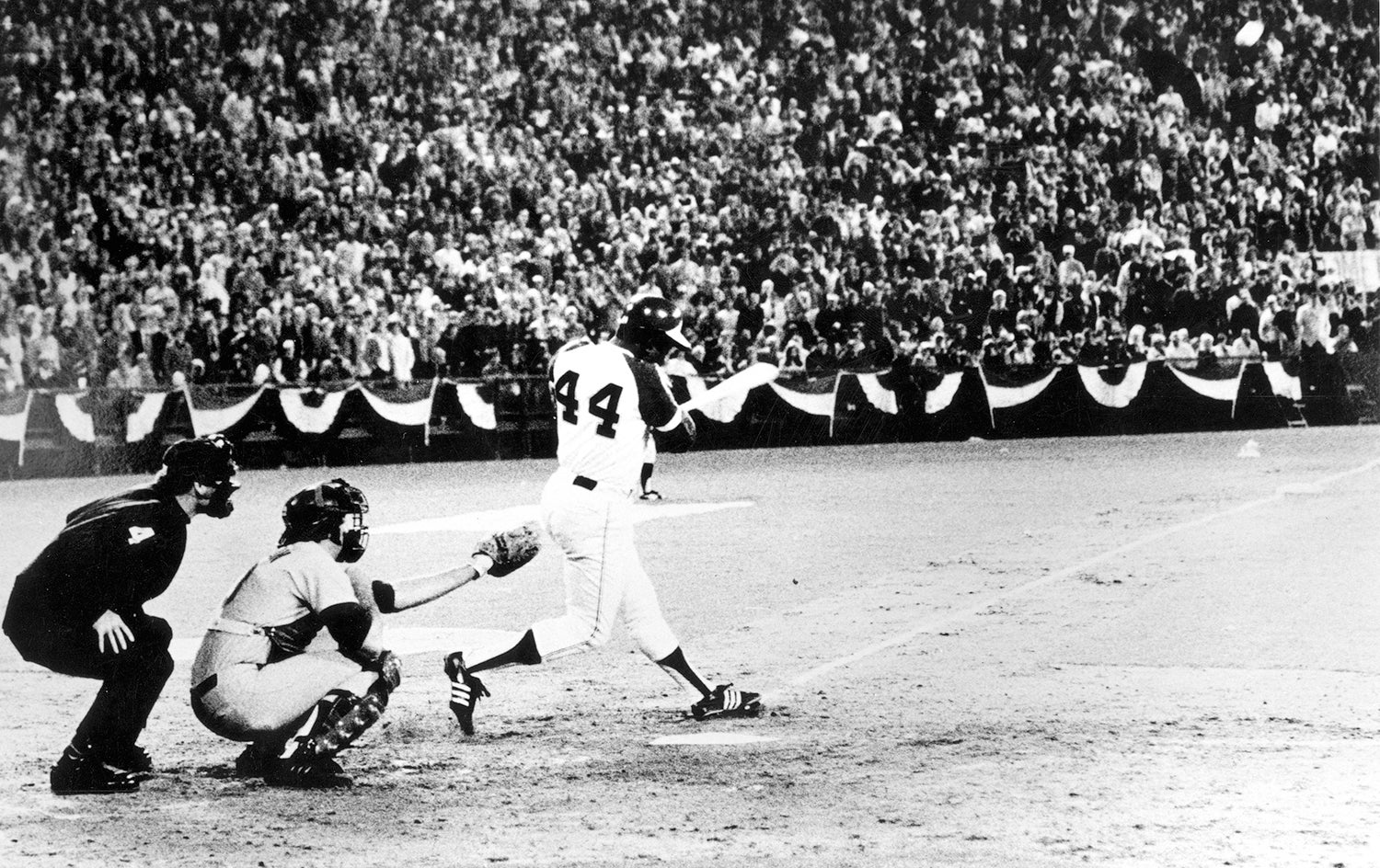
The man
“And I thank God it’s all over with.”
Aaron’s succinct address during the on-field celebration was consistent with Scully’s analysis: The home run chase had been a glorious story for baseball, but not so much for the man himself.
“It was about two-and-a-half years, constantly being harassed by the press,” Aaron told David Letterman in 1982 after his Hall of Fame induction. “The same questions: ‘Why didn’t you hit a home run tonight?’ Even if I would go 4-for-4: ‘Why did you take this pitch?’
“It was pressure because if you’ve never played the game of baseball, people don’t realize that you can’t just walk up to the plate and hit a home run every time you want to.”
Yes, Aaron’s power stroke had often looked effortless, and he had led the National League in home runs four times, but he was not merely a power hitter. Aaron entered 1974 with a career .311 average, tied with Tony Oliva for fourth-best in baseball since his 1954 debut season. He had drawn 1,259 walks and stolen 239 bases — both ninth-best in the sport from 1953-73. And Aaron’s 584 doubles had led the game in that span.
But to demand home runs was to challenge the approach of one of baseball’s most multifaceted offensive weapons.
“I was happy that I got it over with for two reasons,” Aaron told Letterman. “One, for my teammates. And the other was because I wanted to go back and start playing baseball the way I knew how to play it.”
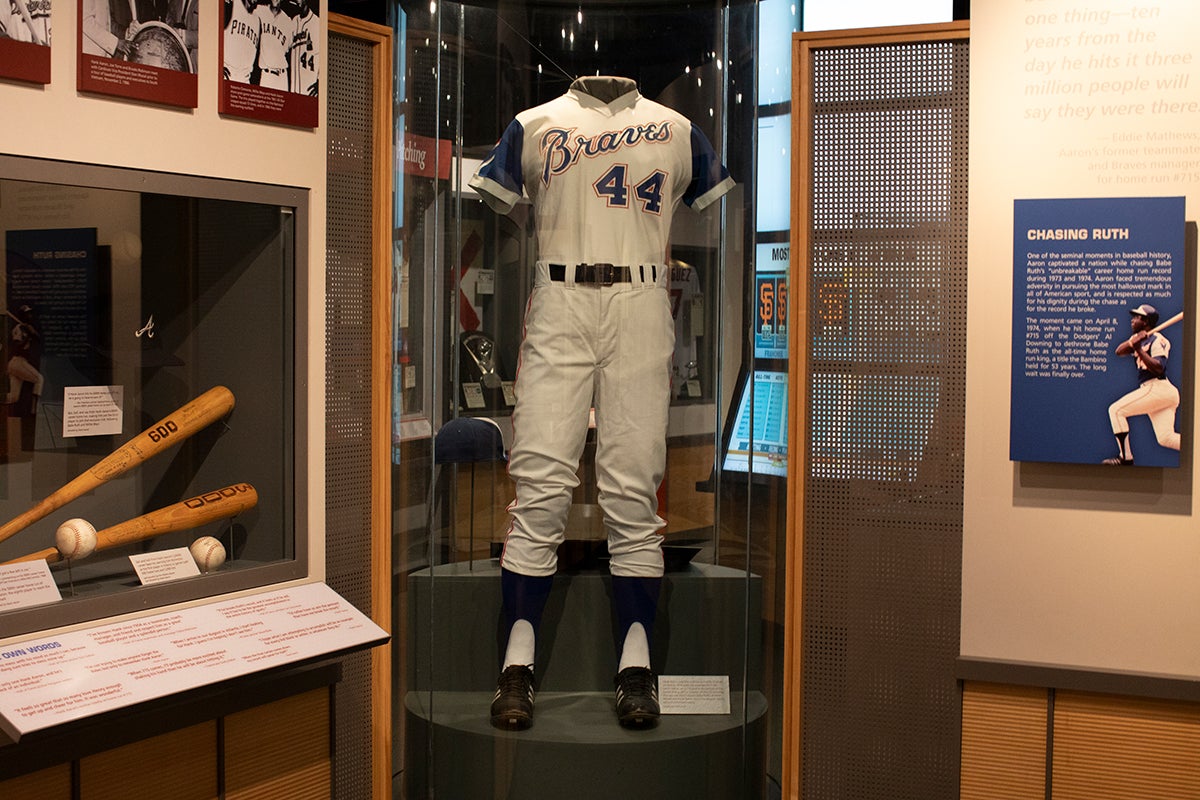
The White House
The game eventually resumed with Atlanta leading 5-3 after four innings. While playing left field, Aaron saw his traveling secretary Donald Davidson running down the foul line. “The President’s on the telephone,” Davidson said.
“What do you want me to do, stop the ballgame?,” Aaron responded. “Just put the President on hold and I’ll be right with him.”
He took the call once he returned to the dugout. “Henry, I would like for you to be my guest at the White House,” said President Richard Nixon. “As soon as possible.”
Of course, Aaron had little free time during the baseball season, and Nixon would resign from office Aug. 9, 1974, amidst the Watergate scandal.
“Hell, I didn’t get there quick enough,” Aaron joked with Letterman.
The bullpen
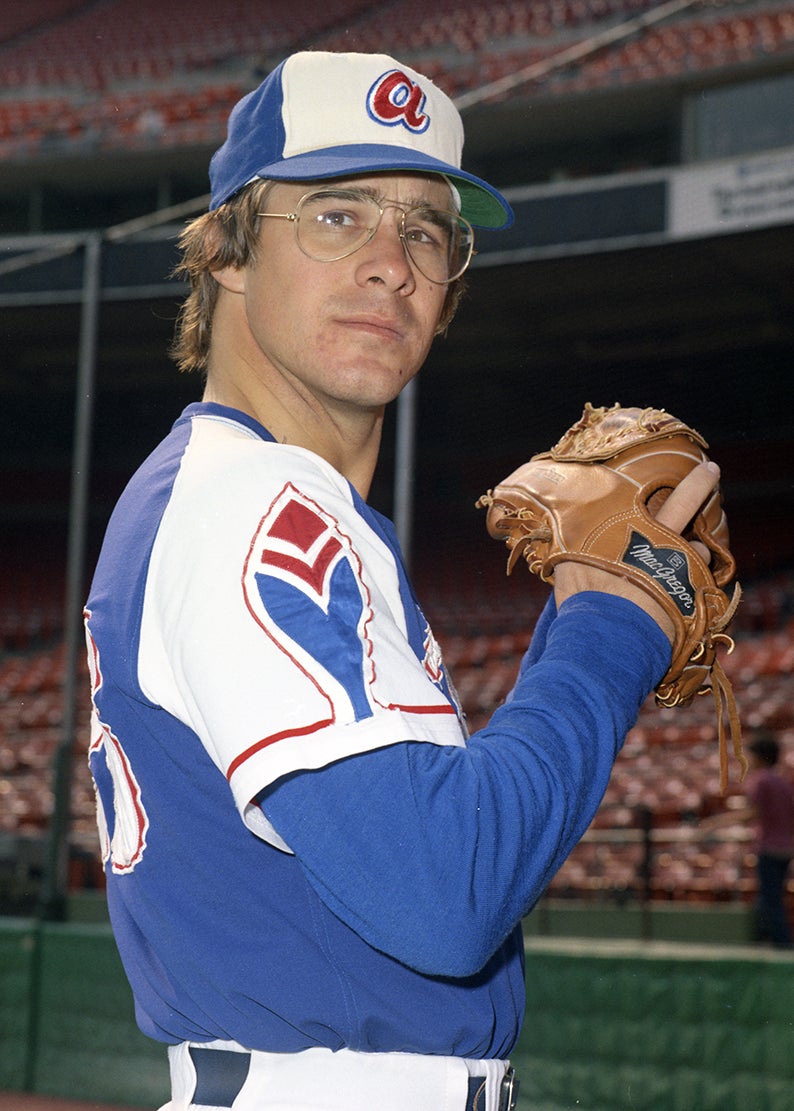
“The highlight of my major league career was catching Henry Aaron’s 715th home run,” Braves reliever Tom House told USA Today in 2015. “That’s the good news. The bad news was that’s still the highlight of my major league career.”
The left-handed House, a Braves pitcher from 1971-75, saved 33 games and posted a 3.79 ERA in his eight-year career. His contributions to baseball — and sports, more broadly — have come as a coach. House has been called the “father of modern pitching mechanics” for his research and teaching of proper throwing mechanics. His coaching has changed the careers of Hall of Fame pitchers Nolan Ryan and Randy Johnson, as well as quarterbacks Tom Brady and Drew Brees, to name a few.
House and his bullpen mates were well-prepared for Hank Aaron’s 715th home run.
“When Babe Ruth’s record was being challenged by Henry in 1973, we divided the area behind the left-field fence, where the bullpen was, into little 10-yard territories,” House said. “The guys with the most big league time got right down the left-field line because Henry pulled most of his home runs. And then the guys with less and less time got closer to center field. We agreed if the ball came to your 10 yards, it belonged to you.”
The home bullpen was prime real estate with Aaron on the brink of history, but Atlanta’s relievers weren’t the only ones aware of this. Singer Sammy Davis Jr. visited their clubhouse before the April 8 game and preemptively offered $25,000 for the ball — a tempting proposition for House, who was making $11,500 that season — to bring it to his upcoming Las Vegas show.
“Second at-bat he comes up, men on base so Al Downing has to pitch to him,” House said. “I know Al Downing, he’s going to keep the ball away. Something good could happen here.
“Whack! I look and I’m going ‘Holy crap! This ball is coming to me!’ If I would have stood still, it would have hit me in the forehead. The next thing I remember, I’m at home plate, ball in my hand, in front of him. He’s hugging his mom. Tears in their eyes. And I say, ‘Here it is, Hammer.’
“I don’t even think he knew who I was, which is okay with me. It was one of the coolest nights of my life.”
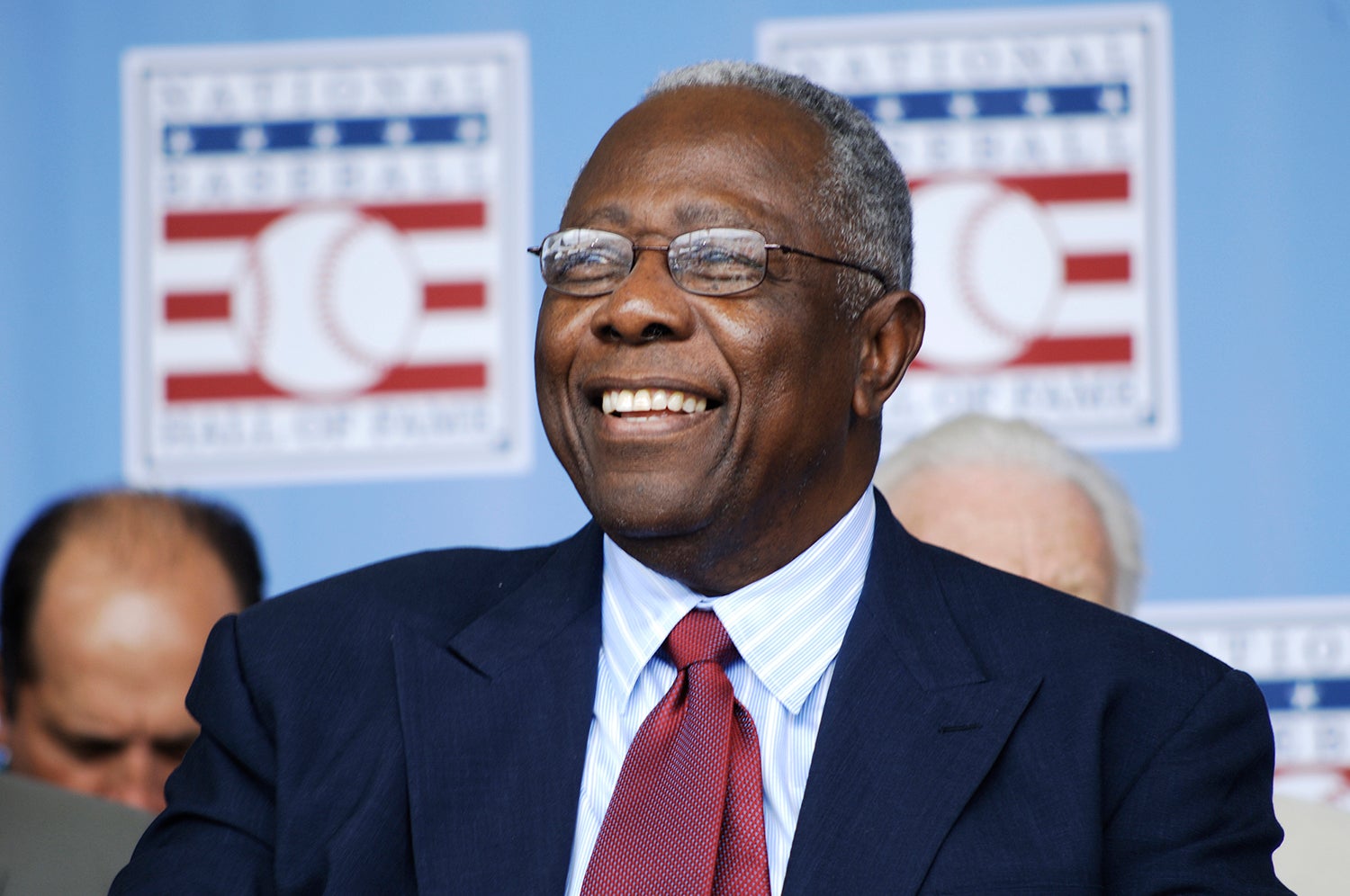
The Hall of Fame
That ball and the bat that hit it are on display at Atlanta’s Truist Park. Aaron’s jersey from the game, meanwhile, is featured in “Hank Aaron: Chasing the Dream” at the National Baseball Hall of Fame and Museum. The exhibit, detailing Aaron’s life from his childhood to post-playing days, also includes the bat and ball from home run No. 714.
Aaron returned to Milwaukee for two final seasons and retired with 755 home runs. The ball from his final blast on July 20, 1976, is another valued piece of the Hall of Fame’s exhibit.
As an 18-year-old in 1952, Hank Aaron played shortstop for the Negro League’s Indianapolis Clowns for $200 a month. Thirty years later, he was inducted into the Hall of Fame as Major League Baseball’s all-time leader in home runs, RBI and total bases.
Justin Alpert was a digital content specialist at the National Baseball Hall of Fame and Museum

